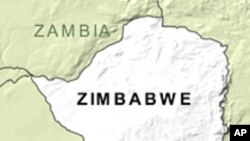The international donor community has given $70 million this year towards the revival of Zimbabwe's agricultural sector.
The international donor community has committed $70 million up from $25 million last year, to help Zimbabwe regain food self-sufficiency.
At a two-day agricultural stakeholders' conference organized by The Zimbabwe Multi-Donor Trust Fund in Harare, a World Bank created fund, VOA spoke to Michael Jenrich of the Food and Agricultural Organization that will implement the new program. He says the money is part of what he called seasonal support for the agricultural sector by Western countries.
"The main donors are the European countries including the European Community, Great Britain, United States and basically all the European countries individually as well," Jenrich said.
Jenrich also says the $70 million includes a $7 million grant given by the Australian government to help vulnerable farmers.
He says the money, which would be used to support small-scale farmers, will not go directly to the government of Zimbabwe, but will be channeled through non-governmental organizations.
"This $70 million is going to support 685,000 communal, small-holder, subsistence farmers in Zimbabwe," Jenrich said. "It is these subsistence farmers who are struggling for the last few years during input rises because of inflation because of input rises unavailability and decline of extension services so these farmers will benefit throughout the country."
Jenrich said though the money falls short of Zimbabwe's requirements this season it will go a long way towards ensuring that small-scale farmers can grow and harvest enough to feed themselves.
The head of the agricultural sector group of the fund, Marchel Gerrmann, told VOA the conference was meant to get Zimbabwean agricultural stakeholders to agree on a common strategy for their country's the recovery. He says the increased agricultural support is a result of donors moving away from providing humanitarian aid to supporting the overall recovery of Zimbabwe.
But he says the donors are worried about reports of white farmers being forced off their farms.
"This conference brings out the need to build confidence with international investors and these farm invasions are not contributing to that,"Gerrmann said.
The shortage of agricultural inputs during Zimbabwe's economic meltdown, as well as unseasonable droughts reduced the country once known as the breadbasket of southern Africa to dependence on food aid.
Critics of President Robert Mugabe blame the slump in agricultural production on his government's land-reform program launched in 2000 that ousted whites from their farms for the resettlement of landless blacks.
News
Donor Community Gives Zimbabwe $70-Million for Agricultural Recovery
update

<!-- IMAGE -->




